May 24, 2025 | 16:29 GMT +7
May 24, 2025 | 16:29 GMT +7
Hotline: 0913.378.918
May 24, 2025 | 16:29 GMT +7
Hotline: 0913.378.918
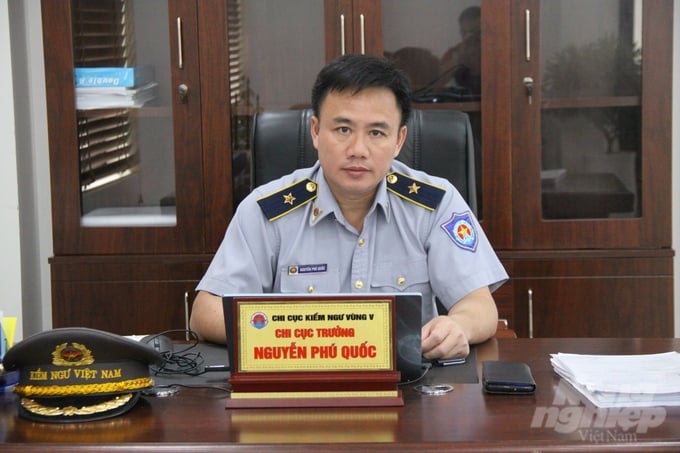
Mr. Nguyen Phu Quoc, Director of the Region V Fisheries Surveillance Branch, shared with Vietnam Agriculture News. Photo: Kien Trung.
In terms of formation timeline, the Fisheries Surveillance Force was established in 2014 and the Region V unit in 2016. In 2018, the Unit V vessel system began operating in Kien Giang and Ca Mau waters where a significant concentration of fishing vessels. The provinces have undefined and overlapping territories that border other nations in the interior region.
As with other seas, the legal basis for these seas has not been finalized, making it difficult for the fisheries surveillance force to patrol these seas.
Other than the specific fisheries of the southwest sea, it is a significant fishing ground. On a daily basis, fishing vessels from ten provinces with enormous exploitation capacity from Binh Thuan backward operate in these regions, particularly the bordering seas.
Prior to 2018, the operation activities of this region were complex. Around 30 Vietnamese fishing vessels are captured daily by foreign entities, and foreign fishing vessels, including several Chinese vessels, violate Vietnamese waters and fishing grounds.
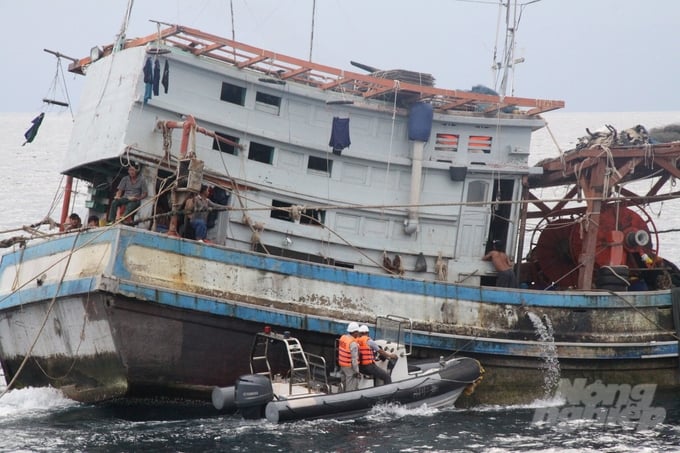
Region V fisheries surveillance approaches fishing vessels in the Southwestern waters. Photo: Kien Trung.
Following a number of patrols and examinations conducted by Unit V in 2018, the fishing industry has been stabilized. Fisheries Surveillance routinely assigns on-duty vessels to bordering seas and overlapped vessels within the region. The allocation of patrol vessels aims to prevent illegal activities on
Vietnam's waters for fishery exploitation as well as preventing foreign vessels from entering Vietnamese waters; support the communication of legislation for fishermen, assisting them to cling to the sea, and participate in the rescue and protection of sovereign seas and islands.
Vietnam has been issued a yellow card warning for IUU violations since 2017. At this time, the Fisheries Law of 2017 was enacted, which altered management by strengthening law enforcement for fisheries exploitation. During this period, we also joined many Agreements, which concretized the Fisheries Law along with guiding Decrees.
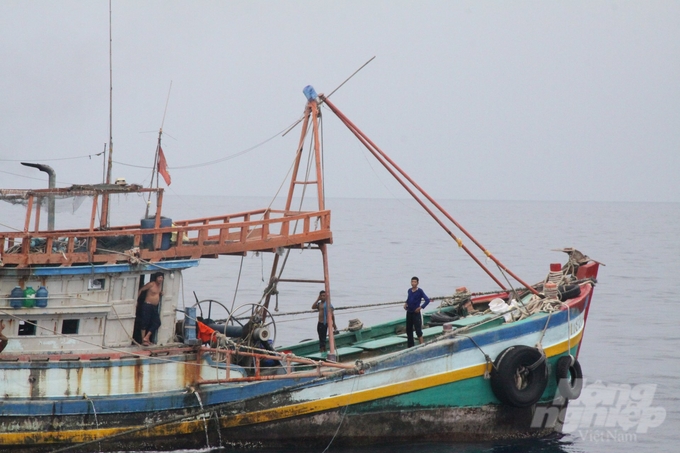
Offshore fishermen catch seafood on the Southwest Coast. Photo: Kien Trung.
In direct relation to the fisheries surveillance force, Decree 42 governs the administration of administrative violations. The level of fines has increased significantly in comparison to previous documents, with fines of 1 billion VND for individuals and up to 2 billion VND for organizations for violations of the Fisheries Logbook, installation of vessel monitoring equipment (VMS), and fishing without a license.
To strengthen law enforcement and remove the EC's IUU yellow card, the Region V Fisheries Surveillance force coordinates with other relevant forces, including the Marine Police Department, to increase patrols and address violations at sea. A joint patrol plan is developed by the local Fisheries Surveillance Department, Coast Guard Region IV, and Border Patrol force. This plan delineates each force's designated sea area and authorizes peak patrols.
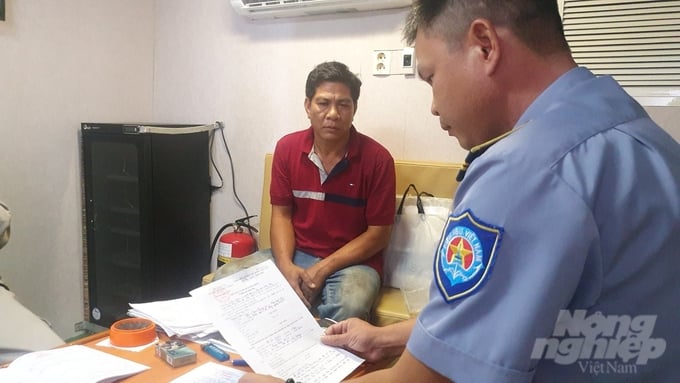
Prepare a record of handling violations of fishing vessels at sea. Photo: Kien Trung.
The second issue is the use of technical and professional measures and the implementation of science and technology to acquire initial information prior to the ship's departure in order to prevent ships from leaving port as soon as possible. Utilize VMS equipment to monitor fishing vessels in order to identify fishing grounds frequented by multiple vessels... From there, formulate a patrol plan, propagate and disseminate the law, and assist fishermen immediately. Examine the list of fishing vessels at risk of engaging in illegal fishing in order to detect and promptly address violations.
Regarding the general remedy, Mr. Nguyen Phu Quoc believes that offending fishing vessels must be prevented from land, not at sea. "At sea, the fishery control force is very small and lacks the necessary resources to erect such barriers. While the ship is still docked, we must discover the cause and forestall it from the start. Mr. Quoc stated that fishing vessels in foreign waters that perpetrate violations must be able to identify what the vessel is doing, where it is located, the typical locations of the violators, and the seasons and times when the violations occur in order to implement preventative measures remotely.
The Director of Region V's Fisheries Surveillance Branch revealed candidly that policies for the fisheries surveillance force and the working environment of the fisheries surveillance force at sea are subject to numerous objective factors, such as weather and storms, and are completely distinct from other activities on land. In fact, we encounter fishing vessels while on surveillance, but we cannot always approach them.
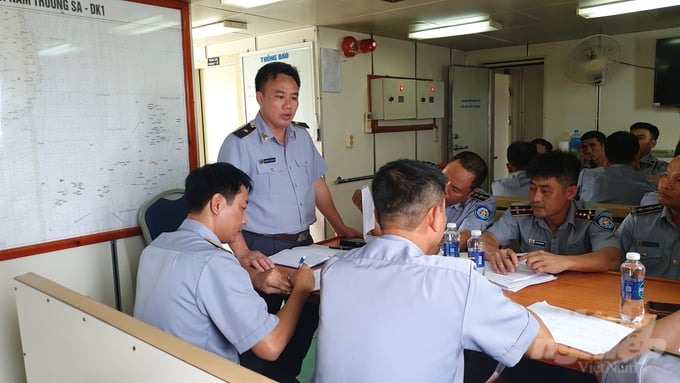
Director of Region V Fisheries Surveillance Branch Nguyen Phu Quoc directs the task of patrolling and controlling fisheries activities of Working Group No. 7. Photo: Kien Trung.
Mr. Quoc stated that many fishermen abandon their occupations due to a number of objective factors, which is also a common occurrence in many other professions as a result of the influence of social networking platforms.
As a result, they transfer to other fields with more leisure time and higher pay. For fishing vessels that repeatedly violate, presently according to the law, each behavior can only be managed once, it is necessary to have sanctions for aggravating circumstances if there are multiple violations.
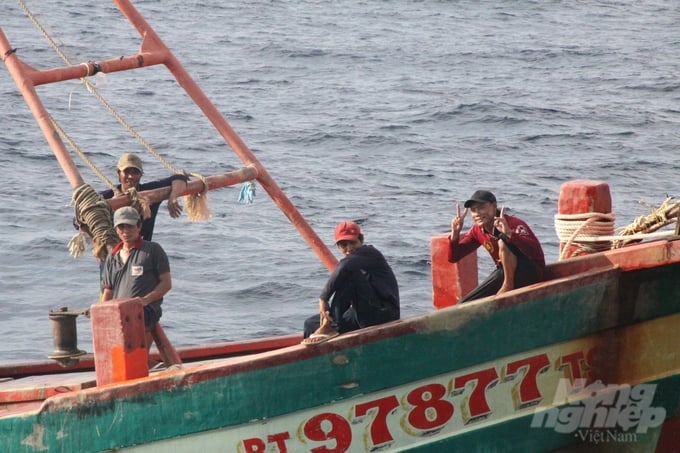
Fishermen cling to the sea in the Southwest Coast.
"Vietnamese fishermen exploit fisheries while also defending the sovereignty of the sea and islands. When exploiting and protecting aquatic resources, individuals must abide by the law. Here, there is a complicated issue, as there are undefined overlaps. Additionally, we must clearly identify contiguous sea and island areas that have been meticulously communicated to mariners.
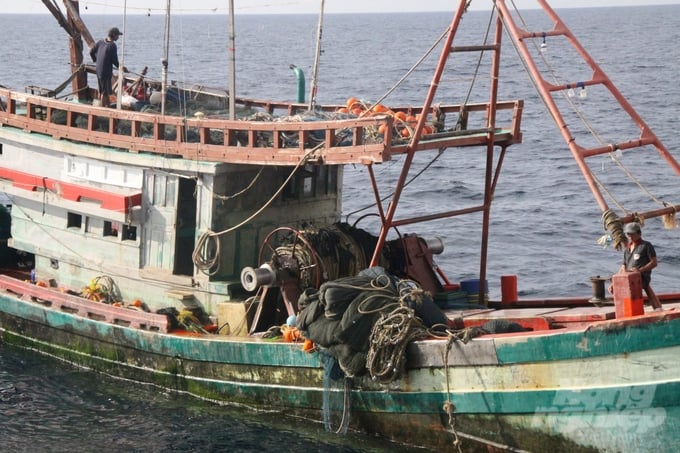
Offshore fishing boats of Kien Giang province. Photo: Kien Trung.
We affirm that the recent violations of foreign waters by fishermen were intentional and not incidental. Numerous fishermen intentionally break the law for financial gain. We must distinguish the two concerns. Fishermen who participate in exploiting and preserving aquatic resources must abide by the law and fish in the proper areas and along the proper routes. In addition to participating in aquatic exploitation, fishermen also safeguard the sovereignty of the country's sea and islands, according to Mr. Quoc.
Translated by Linh Linh

(VAN) The People's Committee of Tra Vinh province has approved an adjustment to the investment policy for the Green Hydrogen Plant project, increasing its area to approximately 52.76 hectares.
![Reducing emissions from rice fields: [2] Farmers’ commitment to the soil](https://t.ex-cdn.com/nongnghiepmoitruong.vn/608w/files/news/2025/05/05/dsc08881jpg-nongnghiep-140632.jpg)
(VAN) Clean rice cultivation model in Thuong Tan commune, Bac Tan Uyen district, is assisting local residents in achieving sustainable agriculture by substantially reducing costs, increasing productivity, and protecting the environment.

(VAN) At the conference to disseminate Resolution No. 68, AgriS introduced its digital agricultural ecosystem and reaffirmed its commitment to accompanying the Government in promoting private sector development and sustainable agriculture.

(VAN) 'Blue Ocean - Blue Foods' initiative is designed to restore marine ecosystems and establish sustainable livelihoods for local communities by cultivating a minimum of 1,000 hectares of cottonii seaweed in the first three years.
/2025/05/21/4642-3-112707_603.jpg)
(VAN) The V-SCOPE project has made direct contributions to three out of six pillars of the Comprehensive Strategic Partnership between Vietnam and Australia.

(VAN) Facing the threat of rabies spreading to the community, Gia Lai province urgently carries out measures to vaccinate dogs and cats on a large scale.

(VAN) Disease-free livestock farming not only protects livestock herds but also stabilizes production and livelihoods for many farmers in Tuyen Quang.